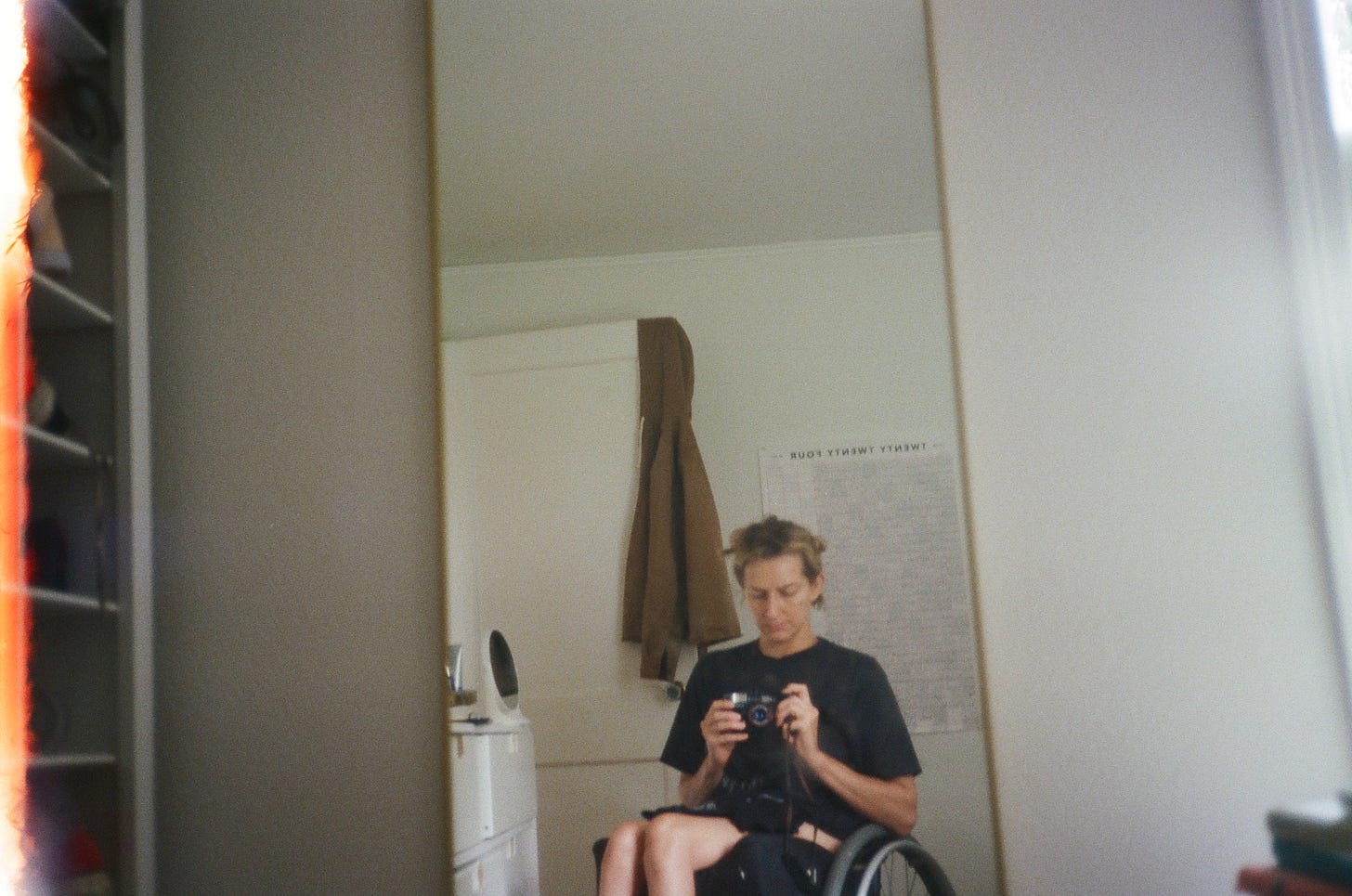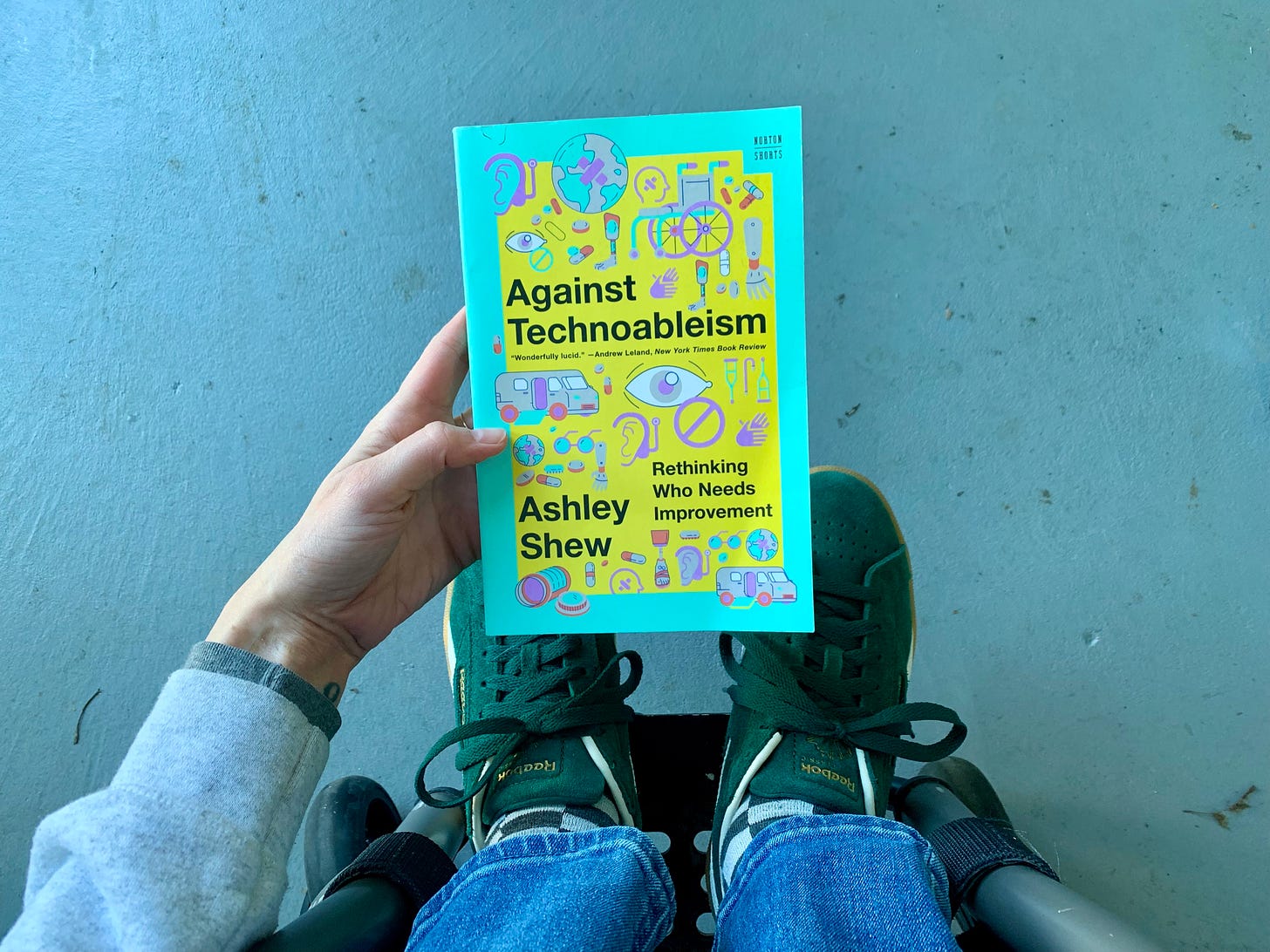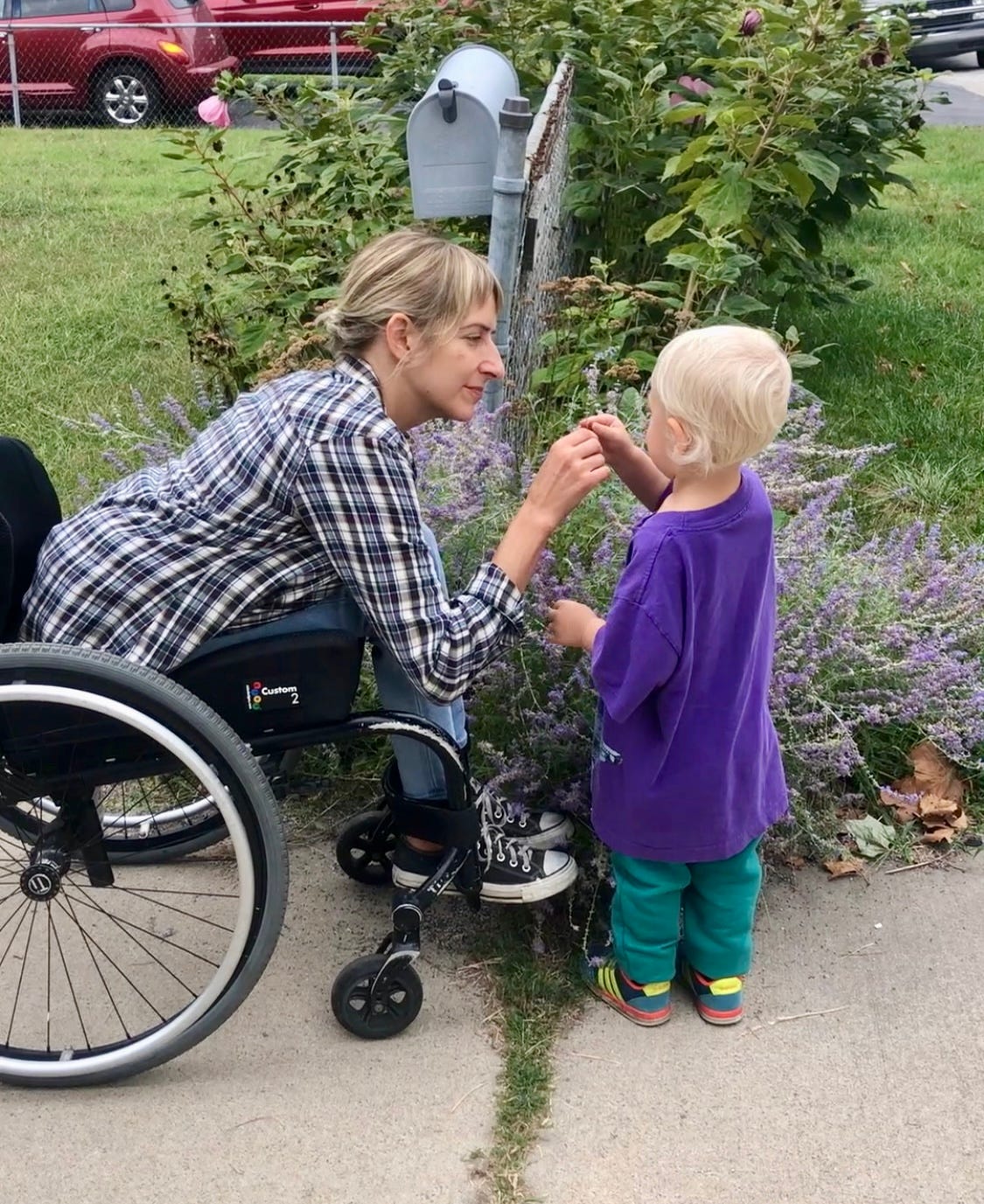A portrait of inefficiency.
In appreciation of the curious, the tiny, the slow, the flexible, the winding.

Folks using screen readers and anyone who prefers to listen — there’s an audio player bar just below this paragraph, with a play button on the far right. Please let me know if you have any trouble with it.
**Quick note up top — I have a lot of events open to the public coming up in March and April. At the bottom of this newsletter, I’ve listed them with some links that provide more details. I’d love to see you there!
Before I typed these words into my computer, I wrote them into a yellow notebook, snuggled up next to my son while he watched a video of someone making a teeny tiny cake with little bitty bowls, spatulas, and ovens. I paused every few sentences to tickle my nose against his leg or watch the moment the baker makes the bitty baby pumpkins. What an inefficient way to make a cake. And also, I dare you to watch a disembodied hand whip up a teeny tiny confection and not feel a spark of wonder and delight.
Writing by hand is also a considerably less efficient way to write an essay. It certainly isn’t my typical newsletter practice. But lately — in quiet protest of the chaotic state of the world, the algorithms shaping our realities, and the “department” recklessly tearing through our government and all that destruction symbolizes — I’ve found myself defiantly delighting in all the inefficiency within and around my being. There is something about this word — efficiency — and the unquestioning value of it that kicks up a spirit of protest in my disabled mother soul. Of course, I understand that “efficiency” is a word that takes many shapes and forms, some of them beneficial, yes, yes, sure. And also, I’ve been driven by a guttural instinct to plunge my oar into the rushing current and slow my boat — to figure out where I am and how to possibly proceed.
And so, I bring to you, 7 portraits of inefficiency:
I wake up stiff. I untangle my paralyzed legs. They shoot out and tremble at the disruption. I wait for them to release, then turn onto my belly to stretch my perpetually tight hamstrings. I hear my son’s thudding feet run across the house as my cheek rests against my green, blobby-patterned sheets. It’s morning time! I shift to my hands and knees, trying to straighten my back as long as I can — 10 seconds! phew! — before I crumple. Knees tucked beneath me, I reach my left arm toward the right corner of the bed, stretching out the muscles behind my left shoulder. For the next 30 minutes, I move through eight different stretches — the slow unfurling required to maintain this inefficient body.

We peek out the windows, spying all the ambitious neighbors, shoveling the snow while it's still light and fluffy. Tomorrow will do! We choose procrastination, delay, a series of taps on the snooze button, tucked inside and warm. By the time Micah makes his way out to the driveway the next day, the snow is heavy and the ice beneath, frozen solid. The task has become much harder. A few minutes in, I spot our neighbor shoveling the other side of our driveway. “Otto, look! It’s Pete! He’s helping Daddy!” Otto rushes to the window. We cheer! We throw our arms into the air! We decide to make him a big cup of hot chocolate and fill it to the brim with marshmallows. We tell him he doesn’t need to return the mug. Otto introduces Pete to Panda, his beloved panda. A few days later, Pete jogs across the street to return the mug with a thank you card addressed to Micah, Rebekah, Otto, and Panda, written by hand and tucked in a green envelope. We exchange phone numbers. We’ve lived here over three years, and this is the first neighbor’s number I have in my phone. I count the layers of surprising delight tucked into our lollygagging.
Otto and I spend days making 23 valentines for all the kids in his class. We cut out paper hearts, writing “I love being your friend” on each one. (Does writing “I love being your friend” over and over again make you love your friends more? I think yes.) We destroy the entire dining room as we color with markers, glue on sparkly red wrapping paper, hot glue 46 pompom eyes, and draw a smile beneath every pair. Otto signs his name again and again. He proudly carries the bag of valentines out the door Friday morning, each one covered with hundreds of invisible fingerprints gathered over days of creative care. (Note to all parents and caregivers who prefer the efficient route on valentines — ZERO JUDGMENT. We’ve had a-million-and-a-half snow days so far this year. It was craft time or wrestling matches. As in, I was literally being challenged to wrestling matches. Bring on the glitter and the glue!)

We ask our podcast listeners to tell us about the songs that have held them as parents and people so we can gather them together in a mixtape. (You can read all of their answers here.) I read each comment slowly, looking up the lyrics to read along as I listen to every song, before adding it to one sprawling Spotify playlist no algorithm could ever generate for me. The songs are a hodgepodge of genres and sentiments, but nearly every one makes me cry. How can I describe it? It’s like that moment in the story when you get on an elevator with blank strangers, and then the elevator gets stuck, and three hours later you realize that you all miss your mom and wish you had better hair. I forget how much love and ache and longing we all hold. Connection over productivity — group projects over algorithms — listening to new songs over getting stuck on the same playlists (literally and also figuratively).
While I drive to pick up Otto from school, I listen to the audio book Against Technoableism: Rethinking Who Needs Improvement by Ashley Shew. I hear a passage that zings me and rewind a couple of times to soak up the idea all the way, turning it over and over in my mind. When I arrive at a stoplight, I grab the paperback tucked beneath my wheelchair on the passenger’s seat and find the line, draw a series of scribbly stars next to the passage: “Ableism is more than just bias: it’s the entire idea that anything can or should be perfect in this universe of entropy and chaos, applied at the level of human bodies and ways of being” (9). Now I’ve heard it three times, read it on paper, and danced my pen around its edges. When I can, I like to jump back and forth between mediums, finding multiple routes into the text, spending extra time with the words that grab me. (Surprise! I am not AI.)
When I arrive at the doorway to Otto’s classroom, I can see it in his body. The boy is squirrely. This is not unusual, but useful information. The walk from his classroom to our car has been a defining part of our relationship since he first started daycare as a two year old. I noticed the difference between us and all the other sets of parents and children immediately. While everyone else was packed up and on their way, loaded in the car and driving off at a steady clip, Otto and I have always moved at a different pace. We pause for dandelions and ants. We often get all the way to the car, only to rush back in the building to pee. Otto is drawn to gardens and bushes and large columns he can turn into a hide-and-seek game. There is a very real part of me that wishes for the clipped, efficient pace to the car. Many days, I am self-conscious and terrified of outsiders judging my skills as a disabled parent. There have even been afternoons, I’m disappointed to admit, when I’ve pointed out to him the fact that we are moving soooo muuuuch slooooower than the other families. (I’m pleased to report this tactic has proved to be an unsuccessful motivator for my son.) This day, Otto spins in circles the entire way down the hall. He throws Panda, then lunges to catch him before he falls, dodging between the sprinkling of kids and their parents. I rush and stop and swerve, keeping his jolting pace. “Excuse us!” I say when we almost run into someone. When we get outside, he runs under the big tree, looking for treasures. I check my impulse to coax him to the car. I sit and watch him crouch in the leaves, digging for treasures. (That he’ll inevitably leave on the floor of my car. Until I start to notice a weird smell.) We’re not — actually — in a rush. We are a plodding, zigzagging, cumbersome pair — connection over commands, wonder over speed, discovery over the one and only path, delight as much as possible.
My brain explodes in panic when I see the headline “Section 504 is Under Attack.” (To learn more about this story, its context, and implications, here is an essay I recently wrote about it. This headline speaks to one of many recent threats to disability rights in the U.S., all of which are ongoing. I recommend the Disability Rights Education and Defense Fund run by disabled folks and parents of those with disabilities for clear, timely, and accurate information.) Reading about the attack on Section 504, I feel overwhelmed, powerless, and small. I remind myself to focus on the good I can do right in front of me — to not devalue the tiny. I read to my son, snuggled up next to him until he falls asleep.

A black-and-white photo of Rebekah snuggled up next to her son, reading to him while he falls asleep. Later that night, I post about the lawsuit in my Instagram stories. I close the app. The next morning, I call the people in my life — even the ones who never vote the same as me — to tell them what is happening. I feel my heart beating fast in my chest. I hear my voice — so fast, so high! I’m on the phone with one person for almost an hour. It feels weird and kind of wonderful to pivot from a series of social media blasts to one long, sprawling, emotionally-charged conversation with someone I know and love and often disagree with over politics. In the next few days, I watch as everyone I called, texted, and talked with contacts their elected officials. The efficiency math prefers blasts to thousands over long, rambling conversations with one —especially when that one might remain unconvinced. There is an expediency in knowing who is and isn’t on your side. And also. The almost absurd insistence on valuing the teeny tiny — the one, the rambling — fuels me. I’m charged with an unexpected slurp of hope. Not every occasion calls for this kind of engagement — my own history makes me cautious — but I want to keep my hands open enough to try sometimes. When my disabled mother soul tells me it’s time to pick up the phone, I want to be ready.
The truth is, everything feels chaotic and uncertain right now. I can feel these flattening forces all around me — overwhelm, chaos, fear, profound political polarization, algorithms that keep me locked in a silo, head down, fixated on the screen in my hand in a constant state of escalating reaction. Somewhere deep in my nervous system, my body thinks going rigid, falling to the ground, and playing dead is how we’ll survive. Of course she does. And also. While I need to find ways to cope, I do not actually want to play dead. Instead, I’ve started to imagine myself moving forward in a belly crawl, close to the ground, inefficiently zigzagging one inch at a time. Like a soldier, a baby, a snail.
Where can I move even slower? What joy/fuel/abundance might I extract from the tedious, the mundane? How can I get even more curious — opening myself up to outcomes I hadn’t imagined? What projects, conversations, tasks can I stretch out well beyond their initial function until I discover the gem I wasn’t even looking for? How can I live out my values in the teeniest, tiniest — even tinier — acts, again and again and again?
The quest is to remain human, part of a bigger ecosystem, so connected to the earth I can feel it beneath my fingernails, in tune with my immediate surroundings, open to surprise, deliberately slow, defiantly curious, relentlessly steady, practicing for flexibility, alert and very much alive for whatever comes next.
CHEWY QUESTIONS – If you want to continue to think through the ideas here, these questions are for you – please feel free to explore this in your personal writing, to talk about it with your people, or to join the conversation on Substack.
Are you feeling the impulse to flatten? Are you finding sideways routes to stay alert/connected/human?
What are your experiences/associations with inefficiency? Do you experience it in your own world? Do you ever find unexpected value there? What does that look/feel/sound like?
Is there a cause you’re fighting for right now that you’d want to share here?
Upcoming Events — Spring 2025
University of Wisconsin-Whitewater — March 11
Delta College President's Speaker Series — March 19
KC Public Library Book Club Discussion — March 29
KC Public Library Big Read Story Time of We Are the Scrappy Ones — April 4
Wichita Public Library — April 12
KC Public Library Discussion & Q&A — April 15
KC Shelf Life Storytelling Event — May 1
Barstow Community College — May 9
Thank you, as always, for being here.
xo
Rebekah









Loved this essay!! (Though I love them all really.) I have a neurological sleep disorder, my brain doesn't transition in and out of sleep or go through the different phases of sleep normally so essentially I don't sleep "efficiently." This means I have to spend more time sleeping than most people and often struggle with the energy needed to keep a life spinning ie. housekeeping, working, feeding myself and all that entails... (I also live alone so if I'm not doing it, it ain't gettin' done.) I am a systems person, detail-oriented and perfectionistic and it's a constant practice to accept my limitations and reject the messages that efficiency and producing is everything. Lately when I lie down for a nap in the middle of my workday I focus on relishing the doing nothingness of it, which helps me from getting swallowed up in thinking I need to be "doing" at any given time and helps me relax enough to sleep and actually rest, where I used to feel this sense of urgency to quickly fall asleep so I can get back to work and pretty much anything else. Now I use it as an important practice, that even if I never fell asleep it is important to sometimes "do nothing" and just stop moving and just be.
Rebekah - love hearing your voice read all of your amazing thoughts. Fills my cup. 🤍